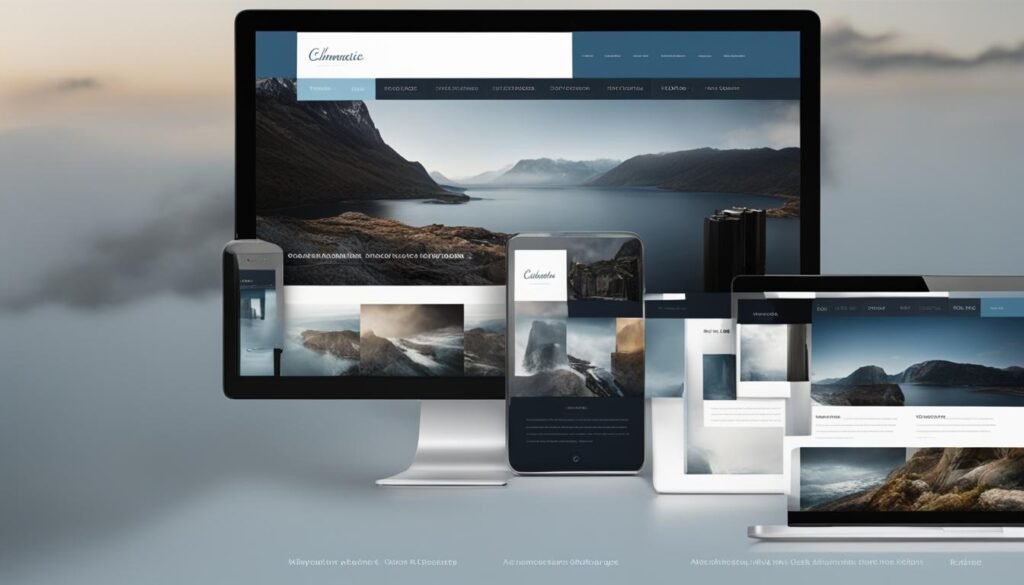Welcome to your ultimate guide on how to start a blog for business!
In today’s digital age, having a blog has become an essential tool for businesses to establish their online presence, attract customers, and generate revenue.
Whether you’re a small business owner or an aspiring entrepreneur, this comprehensive guide will walk you through the essential steps to create a successful and profitable blog.
Starting a blog may seem daunting at first, but with the right guidance and strategy, you can master the art of blogging and leverage it to grow your business.
From choosing a catchy blog name and niche to getting your blog online with web hosting, designing your blog with a free WordPress theme, writing compelling blog posts, promoting your blog to attract readers, and monetizing your blog, we’ve got you covered.
Starting a blog for your business in 2023 has never been easier. With user-friendly platforms and readily available resources, you don’t need to be a tech expert or have a significant budget to get started.
So, let’s dive in and unleash the potential of blogging for your business!
Key Takeaways:
- Starting a blog is essential for business growth and establishing an online presence.
- You don’t need technical expertise or a large budget to start a blog; it’s accessible to everyone.
- Choosing the right blog name and niche is crucial for attracting your target audience.
- Web hosting and a free WordPress theme are the foundations for getting your blog online.
- Writing engaging blog posts and promoting your blog through various channels is key to gaining readers and driving traffic.
What is a Blog and Why Should You Start One?

A blog is a powerful online tool that allows you to regularly publish and share content with your audience.
Whether you’re a business or an individual, starting a blog can greatly benefit your online presence and contribute to your success.
Blogs are typically updated with new content regularly, providing a platform for you to express your ideas, share your expertise, and connect with your target audience.
But why should you start a blog? Well, there are several compelling reasons. First and foremost, a blog allows you to establish yourself or your business as an authority in your field.
By consistently delivering valuable and insightful content, you have the opportunity to establish trust and credibility with your readers.
This will enable you to position yourself as an authoritative and knowledgeable source in your field, fostering a strong and lasting connection with your audience.
Furthermore, a blog allows you to attract and engage with a wider audience. When you create high-quality content that is relevant and valuable to your target audience, you can drive more traffic to your website and increase your online visibility.
This can lead to more opportunities for conversions, whether it’s generating leads, making sales, or building a loyal customer base.
In addition, blogging can also be a source of online income. Through various monetization strategies such as affiliate marketing, sponsored posts, and selling digital products or services, you can potentially generate a passive income stream from your blog.
It’s important to note that while blogging can be a lucrative endeavor, it does require dedication, consistency, and a willingness to adapt to the ever-evolving online landscape.
So, if you’re looking to establish your online presence, connect with your target audience, and potentially generate income, starting a blog is a wise decision.
In the next section, we’ll delve into whether anyone can start a blog and whether technical experience is required.
Can Anyone Start a Blog?
Starting a blog may seem daunting, especially if you have limited technical experience. However, the truth is, that anyone can start a blog, regardless of their age, location, or skill level.
Blogging is becoming increasingly accessible and user-friendly, making it a viable option for individuals looking to make money online or build a profitable business.
With the advent of platforms like WordPress, creating and managing a blog has never been easier. You don’t need advanced coding knowledge or programming skills to get started.
The intuitive interface and wide range of customizable themes and plugins allow you to design a professional-looking blog without any technical expertise. So whether you’re a tech-savvy individual or a complete beginner, starting a blog is within your reach.
Why Start a Blog?
“Blogging has the potential to generate a significant income and provide a platform for you to share your expertise, passion, and ideas with a global audience.”
One of the main reasons people start a blog is the potential to make money from it.
Monetizing your blog requires dedication and effort, but there are multiple avenues to generate income. These include incorporating display ads, partnering with brands for sponsored content, utilizing affiliate marketing, and selling digital products or services.
With dedication and strategic planning, you can turn your blog into a profitable online business.
In addition to the financial aspect, blogging offers numerous benefits. It allows you to express your creativity, connect with like-minded individuals, establish yourself as an authority in your niche, and provide value to your readers.
Moreover, blogging can help you develop valuable skills such as writing, digital marketing, and content creation that can boost your professional profile.
So, if you’ve been hesitant about starting a blog due to concerns about technical know-how or profit potential, rest assured that anyone can embark on this journey.
With the right mindset, dedication, and a willingness to learn, you can join the ranks of successful bloggers and create a platform that not only generates income but also allows you to share your passion and make a difference.
The Cost of Starting a Blog in 2023

Starting a blog is an exciting venture, but it’s essential to consider the cost involved. While blogging can be relatively inexpensive compared to other business endeavors, there are still some expenses to be aware of. One of the main costs you’ll encounter is web hosting.
Web hosting is the service that allows your blog to be accessible on the internet. There are various web hosting providers available, but one highly recommended option is Bluehost. They offer affordable plans starting at $34.50 to $65.40 for the first year, depending on the package you choose.
If you’re on a tight budget, you may be wondering if there are ways to reduce blogging costs. One tip is to take advantage of Bluehost’s introductory offer, which often includes a free domain name.
Additionally, you can explore free WordPress themes to design your blog, eliminating the need to invest in a premium theme. Lastly, consider minimizing other expenses by utilizing free tools and resources available online.
Here are some tips for minimizing blogging costs:
- Opt for a basic web hosting plan with Bluehost or another reputable provider
- Choose a free WordPress theme that aligns with your blog’s aesthetic
- Utilize free plugins and tools to enhance your blog’s functionality
- Take advantage of free resources and educational content available online
Remember, starting a blog doesn’t have to break the bank. With careful planning and budgeting, you can launch your blog on a tight budget and gradually scale up as your blog grows.
The key is to focus on providing valuable content and engaging with your audience while being mindful of your expenses.
Choosing Your Blog Name and Niche
To start a successful blog, one of the first decisions you’ll need to make is choosing a blog name and niche.
Your blog name is like your brand identity, so it’s important to select a name that reflects the topics or the purpose of your blog. Consider keywords related to your niche and try to come up with a name that is memorable and unique.
When choosing a blog niche, think about your interests, expertise, and the audience you want to target. Research popular topics and profitable niches to find the right fit for your blog.
It’s important to select a niche that appeals to a specific target audience and has the potential to generate traffic and engagement. By narrowing down your focus, you can position yourself as an expert in your niche and attract a dedicated audience.
Remember, your blog name and niche are the foundation of your blog’s identity. Take the time to brainstorm and choose wisely, as they will play a crucial role in attracting the right readers and establishing your blog as a valuable resource in your chosen field.
Getting Your Blog Online with Web Hosting

Now that you’ve chosen a blog name and niche, it’s time to get your blog online with web hosting. Web hosting is a service that allows your blog to be accessible on the internet.
One popular and reliable web hosting company is Bluehost. With a variety of hosting plans to choose from, Bluehost makes it easy to get started.
When setting up your blog, consider using WordPress as your blogging platform. WordPress is a free and user-friendly platform that powers millions of websites worldwide. It offers a wide range of themes and plugins, allowing you to customize your blog to fit your brand and style.
To begin, select a web hosting plan that suits your needs. Bluehost offers different plans with varying features, such as the Choice Plus plan, which includes domain privacy to protect your personal information.
Once you’ve chosen a plan, you’ll need to pick a domain name for your blog. Your domain name should be relevant to your niche and easy for readers to remember.
With your web hosting and domain name in place, you’re one step closer to launching your blog. In the next section, we’ll discuss designing your blog with a free WordPress theme, ensuring that your blog looks professional and visually appealing.
Key points:
- Choose a reliable web hosting company like Bluehost.
- Use WordPress as your blogging platform for its user-friendly interface and customization options.
- Select a web hosting plan that suits your needs, such as the Choice Plus plan with added features.
- Pick a domain name that is relevant to your niche and easy for readers to remember.
Designing Your Blog with a Free WordPress Theme

When starting a blog, one of the key aspects to consider is the design. A well-designed blog can attract readers, enhance the user experience, and effectively communicate your brand identity. And the best part?
You don’t need to be a design expert or spend a fortune to achieve a visually appealing blog. With a free WordPress theme, you can easily customize the look and feel of your blog to make it unique and engaging.
Choosing the right WordPress theme is crucial. Look for a theme that aligns with your blog’s niche and target audience. If you’re running a fashion blog, for example, you might want a theme that showcases images and has a sleek, modern design.
On the other hand, if you’re running a personal finance blog, you might prefer a theme that focuses on readability and simplicity.
Once you’ve selected a suitable theme, you can start customizing it to fit your preferences.
WordPress offers a range of customization options, allowing you to create blog pages, organize blog posts, and add widgets or plugins for additional functionality.
Take advantage of these features to make your blog easy to navigate and visually appealing.
Remember, your blog’s design should complement your content. Use relevant images, infographics, and videos to enhance your blog posts and engage your readers.
Incorporate clear headings and subheadings to improve readability. And don’t forget to optimize your blog’s loading speed, as slow websites can result in high bounce rates.
With a well-designed blog, you can create a visually stunning and user-friendly online space to share your ideas, expertise, and passion.
Key points:
- Choose a free WordPress theme that aligns with your blog’s niche and target audience.
- Customize the theme to create a visually appealing blog design.
- Create blog pages, organize blog posts, and add widgets or plugins for enhanced functionality.
- Incorporate relevant images, infographics, and videos to enhance your blog content.
- Optimize your blog’s loading speed for a better user experience.
Writing Your First Blog Post

Now that you’ve set up your blog and chosen a name and niche, it’s time to write your first blog post.
This is where you can showcase your expertise, connect with your audience, and establish your blog’s tone and style. Here are some tips to help you create a compelling and engaging first blog post:
Generate Blog Post Ideas
- Brainstorm topics that align with your niche and would be interesting to your target audience.
- Research popular blogs in your niche for inspiration and identify gaps or areas where you can provide unique insights.
- Create a list of potential blog post ideas to refer to when you’re ready to start writing.
Craft a Catchy Headline
The headline is the first thing readers will see, so it’s important to grab their attention and entice them to click on your post.
Consider using descriptive language, asking a question, or promising a solution to a problem. Make sure your headline accurately reflects the content of your blog post and is relevant to your target audience.
Write Engaging Introductions
The introduction sets the tone for your blog post and should hook your readers from the start.
Use compelling storytelling, ask a thought-provoking question, or provide a surprising statistic to captivate your audience. Make it clear what they can expect to learn or gain from reading your post.
Provide Valuable and Well-Structured Content
Your blog post should provide value to your readers by addressing their pain points, solving their problems, or sharing valuable insights.
Break your content into sections or paragraphs with subheadings to make it easier to read and navigate. Use bullet points or numbered lists to organize information and make it more digestible for your audience.
Remember to write in a conversational and relatable style to connect with your readers. Use your voice and personality to make your blog post unique and engaging.
Don’t forget to proofread and edit your post for grammar and spelling errors before hitting the publish button. Happy blogging!
Promoting Your Blog and Getting Traffic
Now that you have your blog up and running, it’s time to focus on promoting it and getting traffic.
After all, what good is a blog if no one is reading it? In this section, I’ll share some effective strategies to promote your blog and attract readers.
1. Leverage Social Media Platforms
Social media platforms are powerful tools for promoting your blog and connecting with your target audience. Establish profiles on widely-used platforms such as Facebook, Twitter, and Instagram, and consistently distribute your blog posts to effectively engage your audience and increase your online presence.
Engage with your followers, respond to comments, and join relevant groups or communities to expand your reach. Remember to use eye-catching visuals and compelling captions to entice users to click on your blog links.
2. Guest Post on Other Blogs
Guest posting on other blogs is an effective way to get exposure and drive traffic to your blog. Look for blogs in your niche that accept guest contributions and reach out to the blog owners or editors with your pitch.
Craft high-quality, informative articles and include a link back to your blog in your author bio. This boosts your blog’s visibility and helps you establish credibility within your industry.
3. Optimize Your Blog Content for Search Engines
Search engine optimization (SEO) plays a crucial role in driving organic traffic to your blog. Research relevant keywords related to your blog topics and incorporate them naturally into your blog posts, page titles, and meta descriptions.
Utilize header tags (H1, H2, H3) to effectively structure your content and enhance search engine comprehension. This practice facilitates improved organization and accessibility, ensuring your content is readily understood and ranked by search engines. Additionally, focus on creating high-quality, valuable content that provides practical solutions or valuable insights to your target audience.
By implementing these strategies, you can effectively promote your blog and attract readers. Remember, consistency is key, so keep publishing quality content regularly and stay active on social media. With time and effort, you’ll see your blog traffic grow and your audience expand.
Conclusion
In conclusion, starting a blog can be a transformative step in your business journey. It provides an opportunity to showcase your expertise, connect with your target audience, and potentially earn a substantial income online.
With the ease of starting a blog in 2023, now is the perfect time to embark on this exciting venture.
Throughout your blogging journey, it’s important to adapt your strategies based on analytics and feedback.
Monitor your blog’s performance, identify what resonates with your readers, and make necessary adjustments to optimize your content and attract a wider audience.
Consistency is key when it comes to successful blogging. Regularly publishing valuable and engaging content will help establish your blog’s credibility and keep your readers coming back for more.
Additionally, actively promoting your blog on social media platforms, guest posting on other blogs, and building an email newsletter will help generate traffic and expand your reach.
Remember, the blogging landscape is constantly evolving, and staying updated with the latest trends and best practices is crucial. By continuously improving your blog and adapting your strategies, you’ll be well on your way to achieving success in the dynamic world of blogging.
FAQ
Can anyone start a blog?
Yes, starting a blog is accessible to everyone, regardless of age, location, or experience level.
Is technical experience required to start a blog?
No, technical experience is not required to start a blog. There are user-friendly platforms like WordPress that make it easy to set up and manage a blog.
How much does it cost to start a blog in 2023?
The primary expense is web hosting, which can range from $34.50 to $65.40 for the first year. Other blogging costs can be reduced or eliminated to fit a tight budget.
How do I choose a blog name and niche?
When choosing a blog name, consider the topics or brand identity you plan to write about. For the niche, tailor it to cater to your target audience’s interests and needs.
How do I get my blog online with web hosting?
Choose a reliable web hosting company like Bluehost, select a web hosting plan, and pick a domain name. WordPress is a widely used platform for blogging and can be installed through your web hosting’s control panel.
How do I design my blog with a free WordPress theme?
Choose a free WordPress theme that reflects your blog’s brand identity and enhances the user experience. Customize your blog design by creating blog pages, organizing blog posts, and incorporating visually appealing content.
What should I consider when writing my first blog post?
Generate blog post ideas, craft catchy headlines, write engaging introductions, provide valuable content, use a conversational writing style, and incorporate subheadings and formatting. Don’t forget to include a call to action to encourage reader engagement.
How can I promote my blog and get traffic?
Leverage social media platforms to share blog posts, engage with followers, and expand your blog’s reach. Guest posting on other blogs, optimizing blog content for search engines, and networking with other bloggers and influencers can also help attract readers.
